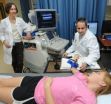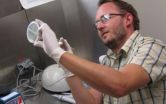Risk of hemorrhage from warfarin higher in clinical practice than clinical trials show
2012-11-26
(Press-News.org) Rates of hemorrhage for older patients on warfarin therapy are much higher than rates reported in clinical trials, found a study published in CMAJ (Canadian Medical Association Journal).
"The rate of hemorrhage in our study is considerably higher than those reported in randomized controlled trials of warfarin therapy, which have ranged between 1% and 3% per person-year," writes lead author Tara Gomes, Institute for Clinical Evaluative Sciences (ICES), Toronto, with coauthors.
Warfarin, a commonly used blood thinner, is used to treat patients with atrial fibrillation to help prevent stroke and blood clots.
The study looked at 125,195 patients in Ontario aged 66 years or older with atrial fibrillation who started warfarin between Apr. 1, 1997 and Mar. 31, 2008. The overall risk of hemorrhage over the 13-year study period was 3.8% per person-year but was 11.8% in the first 30 days of therapy. For people older than 75 years, the overall risk was 4.6% compared with 2.9% for younger people.
Hemorrhage was defined as major bleeding requiring a visit to the emergency department or admission to hospital. Most admissions to hospital involved gastrointestinal hemorrhages (6785, or 63%). Almost 1 in 5 people (1963, or 18%) admitted to hospital for hemorrhages died in care or within a week after discharge.
"There are currently no large studies offering real-world, population-based estimates of hemorrhage rates among patients taking warfarin, which are needed for future comparisons with new anticoagulant agents once they are widely used in routine clinical practice," the authors write.
### END
ELSE PRESS RELEASES FROM THIS DATE:
2012-11-26
In a commentary to be published in the Dec. 12 issue of The Journal of the American Medical Association, two Johns Hopkins faculty members predict an ever-diminishing role for government and drug company funding of basic biomedical research and suggest scientists look to "innovative" kinds of private investment for future resources. Current negotiations in Washington over sequestration and the so-called "fiscal cliff" provide an opportunity to fundamentally rethink the funding of biomedical research, they say.
Pointing to a decade of flat government funding for biomedical ...
2012-11-26
Antifibrinolytic drugs are frequently used to prevent blood loss during surgery, but sometimes cause convulsive seizures. In this issue of the Journal of Clinical Investigation, researchers led by Beverly Orser at the University of Toronto investigated the molecular mechanisms that underlie this side effect. By studying antifibrinolytics in mice, Orser and colleagues found that the drugs inhibited the activity of glycine receptors in the brain, leading to seizures. Seizures could be prevented by co-treatment with the general anesthetic isoflurane. This study explains the ...
2012-11-26
Obesity is associated with insulin resistance and type 2 diabetes, both of which can be significantly improved by weight loss. Gastric bypass and adjustable gastric banding are two bariatric surgery techniques that are frequently used to effect weight loss in obese patients, but it is unclear if the two procedures produce different outcomes. In this issue of the Journal of Clinical Investigation, researchers led by Samuel Klein at the University of Washington School of Medicine in St. Louis compared the effects of 20% weight loss induced by either gastric bypass or adjustable ...
2012-11-26
Bariatric surgery procedures have similar therapeutic benefits in obese adults
Obesity is associated with insulin resistance and type 2 diabetes, both of which can be significantly improved by weight loss. Gastric bypass and adjustable gastric banding are two bariatric surgery techniques that are frequently used to effect weight loss in obese patients, but it is unclear if the two procedures produce different outcomes. In this issue of the Journal of Clinical Investigation, researchers led by Samuel Klein at the University of Washington School of Medicine in St. Louis ...
2012-11-26
ANN ARBOR—It's a sad but familiar scene near the grounds of many medical campuses: hospital-gowned patients, some toting rolling IV poles, huddled in clumps under bus shelters or warming areas, smoking cigarettes.
Smoking causes 30 percent of all cancer deaths and 87 percent of all lung cancer deaths. Yet, roughly 50 percent to 83 percent of cancer patients keep smoking after a cancer diagnosis, through treatment and beyond, says Sonia Duffy, University of Michigan School of Nursing researcher. For patients who quit on their own, relapse rates (as in the general population) ...
2012-11-26
When faced with scandal or wrongdoing, corporations should stick to the facts in their post-crisis messaging, according to a new study from researchers at Rice University, the University of Georgia and the University of Maryland – College Park.
The study, "Managing the message: The effects of firm actions and industry spillovers on media coverage following wrongdoing," examined quarterly media coverage of 45 U.S. public toy companies a 10-year period and over 5,500 press releases generated by the companies during that time.
Almost half of the companies surveyed conducted ...
2012-11-26
Some people live their lives by the motto "no risk - no fun!" and avoid hardly any risks. Others are clearly more cautious and focus primarily on safety when investing and for other business activities. Scientists from the University of Bonn in cooperation with colleagues from the University of Zurich studied the attitudes towards risk in a group of 56 subjects. They found that in people who preferred safety, certain regions of the brain show a higher level of activation when they are confronted with quite unforeseeable situations. In addition, they do not distinguish as ...
2012-11-26
AUGUSTA, Ga. – The first evidence of blood vessel dysfunction has been found in a small cohort of generally healthy young people with cystic fibrosis, researchers report.
"Even though the lung function in these kids is fine at this point, there is evidence of vascular dysfunction and exercise intolerance," said Dr. Ryan A. Harris, clinical exercise physiologist at the Medical College of Georgia and Institute of Public and Preventive Health at Georgia Health Sciences University. "We think this blood vessel dysfunction could be contributing to their exercise intolerance, ...
2012-11-26
It all started with a crab apple tree.
Two years ago, a 71-year-old Indiana man impaled his hand on a branch after cutting down a dead tree. The wound caused an infection that led scientists to discover a new bacterium and solve a mystery about how bacteria came to live inside insects.
On Oct. 15, 2010, Thomas Fritz, a retired inventor, engineer and volunteer firefighter, cut down a dead, 10-foot-tall crab apple tree outside his home near Evansville, Ind.
As he dragged away the debris, he got tangled in it and fell. A small branch impaled his right hand in the fleshy ...
2012-11-26
Visualize a dusty place where stream beds are sand and lakes are flats of dried mud. Are we on Mars? In fact, we're on arid parts of Earth, a planet where water covers some 70 percent of the surface.
How long will water be readily available to nourish life here?
Scientists funded by the National Science Foundation's (NSF) Dynamics of Coupled Natural and Human Systems (CNH) program are finding new answers.
NSF-supported CNH researchers will address water resources management and policy in a changing world at the fall meeting of the American Geophysical Union (AGU), ...
LAST 30 PRESS RELEASES:
[Press-News.org] Risk of hemorrhage from warfarin higher in clinical practice than clinical trials show


